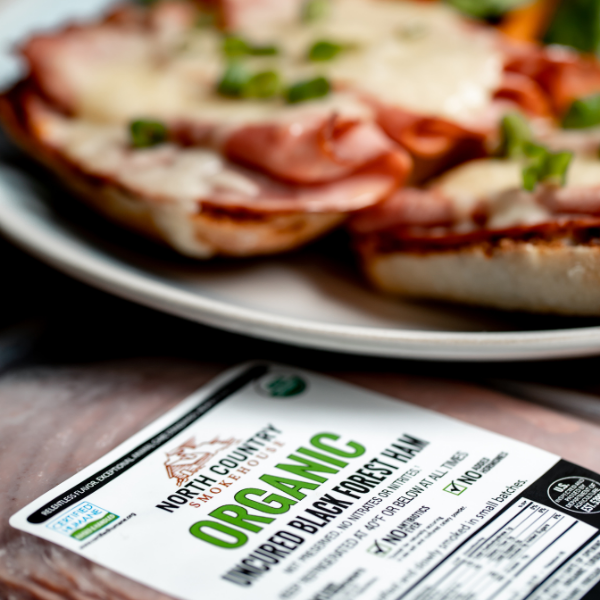
Before diving into the important question of why eat organic, let’s start with what is organic? The USDA Organic program outlines standards of compliance for things like soil quality, animal welfare practices, the use of pesticides, and chemical additives. Regulations prohibit organic foods from containing ingredients made with artificial preservatives, colors, or flavors. When it comes to organic meat, animals must be raised in living conditions that accommodate natural behaviors like rooting, grazing, and foraging. They cannot be administered antibiotics or added-growth hormones. Finally, organic foods cannot contain genetically modified organisms (GMOs).
It is estimated that more than $1 trillion dollars is spent on food annually, but only 5% of that number is spent on organics. Organic food is the fastest-growing food segment with more people opting for non-GMO organic meats in place of conventional products. With so much information readily available about the benefits of organic foods and farming practices, we cannot help but ask ourselves why more shoppers have not made the switch?
If you’re on the fence, wondering why the sudden shift towards organic food is such a big deal, or worse – you feel like the path towards organic foods is laden with false claims or label whitewashing – this short read can help you stack up the evidence in favor of organic eats. There are hundreds of reasons to grace your plate with sustainably sourced meats. From health and wellness to environmentally friendly farming, we’re here to break it down for you – in small bites.
“When one tugs at a single thing in nature, he finds it attached to the rest of the world.” – John Muir
No GMOs
Genetically modified organisms (GMOs) are defined as plants, animals, or microorganisms whose genetic makeup has been modified in a laboratory to create combinations not normally found in nature. They were designed to make crops more resistant to herbicides, insecticides, pesticides, and increase crop yield.
Foods containing GMOs require ever-increasing, toxic herbicides to control crops, most of which contain glyphosate, a key ingredient in Monsanto’s Roundup ®. In March 2015, the World Health Organization determined that the herbicide glyphosate is “probably carcinogenic to humans.”
GMOs are found in many of the products people buy every day and new GMOs are being developed all the time. Their safety is unknown due to the lack of credible, long-term studies. Sixty-four countries around the world, including Australia, Japan, and all the countries in the European Union, require genetically modified foods to be labeled. The vast majority of the crops grown in North America are genetically modified. For this reason, many consumers choose to opt-out of what is commonly referred to as the ‘GMO Experiment’.
GMOs promote non-sustainable, chemical agriculture and are developed and sold by the world’s largest chemical companies. The long-term impact of GMOs remains unknown but what we do know is that their effects on personal health and the environment are wide-spreading and permanent.
Support for a Healthy Environment
Organic farming has long-term, positive impacts on soil, water, air, biodiversity, and climate change. The practice aims to establish an ecological balance between food production and the environment. Our organic farms rely on renewable resources and reduce the use of harmful chemicals in the environment. Considered a proactive approach to long-term sustainability, these practices protect environmental health by reducing the use of non-renewable energy, agrochemicals, and fossil fuels.
It’s More Natural
USDA organic standards strictly monitor the use of insecticides, fungicides, fertilizers, and weedkillers in food production. Organic farms produce healthy foods without the use of synthetic additives. If they do use pesticides, they are derived from natural substances.
No Artificial Colors, Flavors or Preservatives
Clean food means a cleaner diet and better health. Artificial preservatives, colors, and flavors are not allowed in organic foods. These synthetic substances have been linked to serious health problems such as hyperactivity in children, depression, and cancer. Certain artificial flavors have been banned by the U.S. Food and Drug Administration as well as the FDA and the European Union. Our organic Applewood Smoked bacon, sausage, and deli meats proudly display ‘free-from’ claims’, so shoppers can find better-for-you food options on the shelf easily.
Clean Water
Organic farms use natural fertilizers and compostable matter. Research shows crops grown in healthy soil can resist disease, survive drought, and tolerate insects more readily. Organic farming reduces the need for toxic pesticides, which create harmful runoff and contaminate ground and surface water, negatively impacting aquatic life.
Hold the Antibiotics and Added Growth Hormones
Most experts agree that the use of antibiotics has adverse effects on public health. Consuming trace amounts of antibiotics over an extended period creates an unnatural tolerance to these medications, making germs increasingly drug-resistant, and medications less effective over time. Support everyday health by choosing antibiotic-free bacon with no growth hormones.
The Future
Organic food is the largest growing sector of the food industry but only accounts for 5% of the $1 trillion dollars spent on food annually. The more consumers demand organic food, the faster it will be produced to meet that demand. The higher the demand, the more affordable the products become. That means organic food will become more readily available to people of all walks of life, and everyone should have access to better-for-you food. When you buy organic, you are doing your part to protect the earth’s natural resources for future generations.
So, there you have it, seven simple truths about the benefits of eating organic. We encourage consumers to visit sites like USDA Organic, US Department of Agriculture, and the Non-GMO Project for more information about organic food and farming.
At North Country Smokehouse, we believe the choices we make have a significant and lasting impact on the quality of life for people and the planet. We are committed to the evolution of better-for-you foods and handcrafting them with integrity, transparency, and respect. It is our mission to restore value to our farm and food systems.

